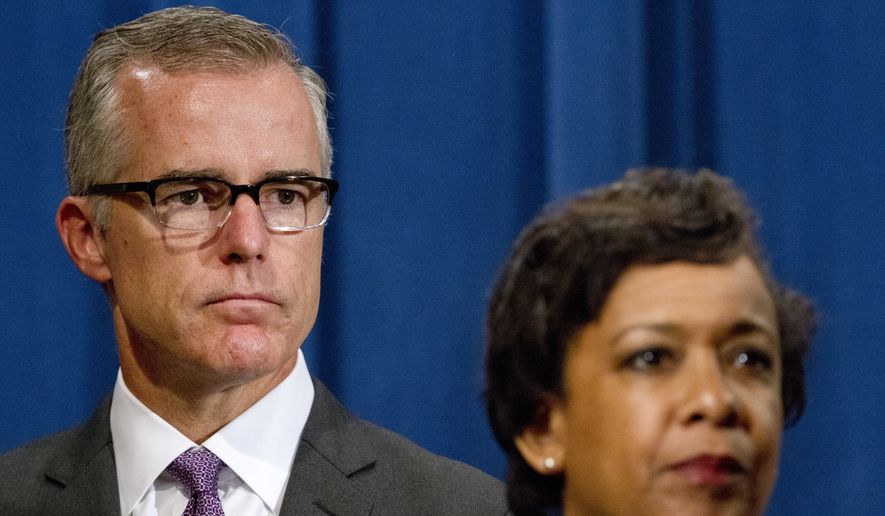The FBI is declining to repudiate the Russia dossier on which it partially relied to start an investigation into the Trump campaign, but it concedes the document’s major core charges of election collusion remain unsubstantiated.
Sources familiar with House and Senate investigations say this is the FBI’s dossier talking point 17 months after agents were first briefed in July 2016 as Donald Trump battled Hillary Clinton for the White House.
The most recent FBI witness was Deputy Director Andrew McCabe, who spent nearly eight hours last week in a closed session before the House Permanent Select Committee on Intelligence.
Republicans believe they have unearthed a scandal inside the bureau’s top echelons over its determination to target Trump associates based on flimsy evidence and improper Justice Department contacts.
Republican committee members pressed Mr. McCabe about a dossier that was financed by the Democratic National Committee and the Clinton campaign based on gossip-tinged information from paid, unidentified Kremlin operatives.
Mr. McCabe declined to criticize the dossier’s 35 pages of salacious and criminal charges against Donald Trump and his aides, but he said it remains largely unverified, according to a source familiar with ongoing congressional inquiries.
Sources speculated to The Washington Times that it would be embarrassing for Mr. McCabe to condemn a political opposition research paper on which his agents based decisions to open a counterintelligence investigation and interview witnesses. Some press reports said the FBI cited the dossier’s information in requests for court-approved wiretaps.
The Washington Post reported Saturday that Mr. McCabe plans to retire early next year.
Justice Department Inspector General Michael E. Horowitz is investigating whether Mr. McCabe should have recused himself from the Clinton email investigation in 2015 and 2016. Mr. McCabe’s wife, an unsuccessful 2015 Democratic candidate for Virginia state Senate, received more than $700,000 in campaign donations from two PACs, one of which was controlled by Gov. Terry McAuliffe, a close Clinton ally.
Mr. Horowitz announced the investigation shortly before Mr. Trump took office. Since then, his probe has widened into whether the FBI investigation into suspected Trump-Russia collusion is rigged.
It centers on the FBI’s Peter Strzok, the lead agent in the Trump case until special counsel Robert Mueller fired him in July. The reason: He sent a number of text messages ridiculing Mr. Trump to Lisa Page, his FBI lover. He texted about a meeting with “Andy” — apparently Mr. McCabe — in which it was discussed that Mr. Trump had no chance of winning, but there was a risk he might.
“I’m afraid we can’t take that risk,” Mr. Strzok said in August 2016. “It’s like an insurance policy in the unlikely event you die before you’re 40.”
The dossier’s author, former British spy Christopher Steele, bragged to Mother Jones magazine in October 2016 that he successfully urged the FBI to begin investigating the Trump team based on his memos. Republicans have ridiculed the bureau for trusting a paid agent of the Clinton campaign.
Fox News and the Washington Examiner reported that Republicans asked what parts of the dossier the FBI had confirmed. Mr. McCabe said the only substantiated collusion-related incident was that Trump campaign volunteer Carter Page traveled to Moscow in July 2016.
The answer surprised Republicans: Mr. Page’s trip to deliver a speech at a university was widely publicized at the time.
An FBI spokesman declined to comment on Mr. McCabe’s testimony because it was given during a closed hearing.
What is unfolding for the House intelligence committee is an investigation that has broadened from supposed collusion between Russia and the Trump campaign.
Driven by Chairman Devin Nunes, California Republican, the committee is examining the following:
• Who funded the dossier and how its information was spread by paymaster Fusion GPS and then used by the FBI.
• The Obama administration’s “unmasking” of the identities of private citizens caught up in surveillance of foreigners.
• Recent misconduct inside the Department of Justice and the FBI.
For months, Mr. Nunes repeatedly pressed the Justice Department to explain why Mr. Mueller fired his top FBI agent, Mr. Strzok. Eventually, Justice turned over text messages showing Mr. Strzok’s deep biases toward the man he was investigating, Mr. Trump.
The committee also unearthed the fact that senior Justice attorney Bruce Ohr made contact with Mr. Steele during the presidential campaign and that Mr. Ohr’s wife was employed by Fusion GPS at the time it was investigating the Trump campaign’s Russia ties. The Justice Department stripped Mr. Ohr of one of his two portfolios.
Most recently, The Washington Post reported that James Baker, the FBI’s general counsel and a close associate of fired FBI Director James B. Comey, was being transferred. Politico reported that Mr. Baker during the election had contact with the Mother Jones reporter who interviewed Mr. Steele via Skype and gave much credence to his dossier.
“This is really problematic for the FBI and DOJ right now,” said the source familiar with the congressional investigations. “They realize stonewalling is not going to work anymore, but they haven’t decided on a new strategy to manage the deluge of information spilling out about top officials’ conflicts of interest, their use of the Steele dossier and their own connections to Fusion GPS.”
Mr. Comey took to his Twitter account Friday night to lament Mr. Baker’s fate.
“Sadly, we are now at a point in our political life when anyone can be attacked for partisan gain,” Mr. Comey tweeted. “James Baker, who is stepping down as FBI General Counsel, served our country incredibly well for 25 years & deserves better. He is what we should all want our public servants to be.”
• Rowan Scarborough can be reached at rscarborough@washingtontimes.com.




Please read our comment policy before commenting.